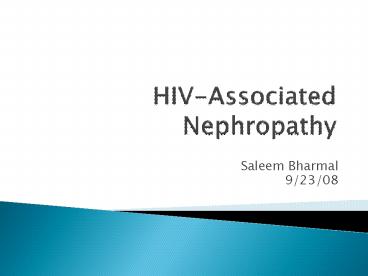HIVAssociated Nephropathy PowerPoint PPT Presentation
1 / 15
Title: HIVAssociated Nephropathy
1
HIV-Associated Nephropathy
- Saleem Bharmal
- 9/23/08
2
HIV-Associated Nephropathy
- Association between HIV and renal disease first
reported in 1984 - HIV-1 seropositive patients
- Renal syndrome characterized by progressive renal
failure and proteinuria - Most common kidney biopsy finding was FSGS
3
HIV-Associated Nephropathy
- HIV-1 seropositive
- Low CD4 counts (lt 250) and/or other criteria for
AIDS - Proteinuria, often in the nephrotic range
- Most patients have moderate to severe renal
insufficiency at the time of diagnosis - Peripheral edema is uncommon
- Hypertension is rare
- Renal ultrasound shows echogenic kidneys that are
normal-to-large in size
4
Key Histopathologic Features
- Collapsing form of Focal segmental
glomerulosclerosis (FSGS) - Microcystic dilatation or renal tubules
- Globally sclerotic glomeruli
- Lymphocytic interstitial infiltrates and
Interstitial fibrosis - Podocyte proliferation and loss of podocyte
differentiation markers - Endothelial tubuloreticular inclusions seen on EM
5
Collapsing FGS and Microcystic Dilatation of the
Tubules
6
Endothelial Tubuloreticular Inclusions (TRI)
7
Role of Biopsy
- Only 40-50 are confirmed to be HIVAN by renal
biopsy in suspected cases - Alternative findings include
- MPGN (Hep C) MN (Hep B)
- IgA nephropathy Diabetic nephropathy
- Amyloidosis AIN
- Cryoglobulinemia MCD
8
Racial Predilection and Genetic Factors
- Effects mainly black and hispanic patients
- In the US, black patients with HIV-1 are 12 times
more likely to develop HIVAN than non-black
patients. - Now the third leading cause of ESRD in African
Americans between age 20 and 64 - Marked racial disparity suggests genetic factors
are important determinants of HIVAN
9
HIV-1 transgenic mouse model
- Mice transgenic for replication defective HIV-1
construct lacking gag/pol genes developed
proteinuria, renal failure, and histologic
disease identical to HIVAN - Nephropathy developed in kidney transplanted from
transgenic mice into wild type, but not in
kidneys from normal wild type transplanted into
transgenic mice
10
Confirmation that HIV-1 infects Renal Epithelial
Cells
- Bruggeman et al. reported a series of 20 HIV-1
seropostive pts with renal disease who underwent
renal biopsy - 15 of the 20 pts had HIVAN confirmed by biopsy
- In 11 of the 15 pts with HIVAN, HIV-1 was
detectable in renal epithelial cells by RNA in
situ hybridization - HIV-1 RNA was detected in renal tubular
epithelial cells, glomerular visceral and
parietal epithelial cells, and interstitial
leukocytes
11
Reservoir for HIV-1
- Bruggeman et al. later detected HIV-1in renal
cells by both RNA in situ hybridization and DNA
in situ PCR in 3 patients with undetectable viral
loads - Case repot by Winston et al. described a pt who
developed HIVAN with acute HIV-1 seroconversion
that imporved with HAART however the pt continued
to express HIV-1 in renal epithelial cells
12
HIV-1 Genome
- Consists of 9 genes that encode fifteen protein
13
Podocytes
- Podocytes are normally terminally differentiated,
quiescent cells that do not proliferate - The collapsing glomerulopathy of HIVAN is
characterized by marked podocyte
dedifferentiation and proliferation - Husain et al. showed that nef in vitro is
necessary to cause most of the podocyte changes
seen in HIVAN
14
Treatments (HAART)
HIV-1-associated nephropathy incidence stratified
by AIDS status and antiretroviral use. White
bars, no antiretroviral therapy light grey bars,
nucleoside reverse transcriptase inhibitor
therapy dark gray bars, highly active
antiretroviral therapy.
The incidence of HIV-1-associated nephropathy by
calendar period and AIDS status.
Lucas AIDS, Volume 18(3).February 20,
2004.541-546
15
Treatments
- ACE Inhibitors Small studies have shown benefit
in patients who have been put on ACEI complared
to those who were not on ACEI with decrease in
proteinuria and decrease rate of renal
dysfunction - ? Prednisone Only a few small retrospective
cohort studies have shown decrease in serum Cre
and prtoeinuria after treatment with prednisone

